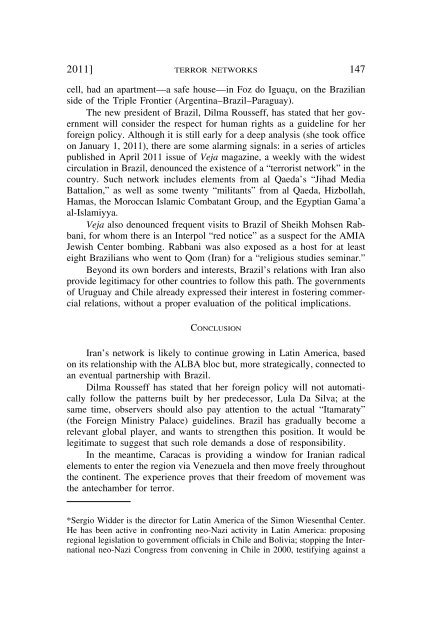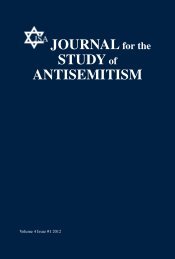JOURNALfor the STUDYof ANTISEMITISM
JOURNALfor the STUDYof ANTISEMITISM
JOURNALfor the STUDYof ANTISEMITISM
Create successful ePaper yourself
Turn your PDF publications into a flip-book with our unique Google optimized e-Paper software.
2011] TERROR NETWORKS 147<br />
cell, had an apartment—a safe house—in Foz do Iguaçu, on <strong>the</strong> Brazilian<br />
side of <strong>the</strong> Triple Frontier (Argentina–Brazil–Paraguay).<br />
The new president of Brazil, Dilma Rousseff, has stated that her government<br />
will consider <strong>the</strong> respect for human rights as a guideline for her<br />
foreign policy. Although it is still early for a deep analysis (she took office<br />
on January 1, 2011), <strong>the</strong>re are some alarming signals: in a series of articles<br />
published in April 2011 issue of Veja magazine, a weekly with <strong>the</strong> widest<br />
circulation in Brazil, denounced <strong>the</strong> existence of a “terrorist network” in <strong>the</strong><br />
country. Such network includes elements from al Qaeda’s “Jihad Media<br />
Battalion,” as well as some twenty “militants” from al Qaeda, Hizbollah,<br />
Hamas, <strong>the</strong> Moroccan Islamic Combatant Group, and <strong>the</strong> Egyptian Gama’a<br />
al-Islamiyya.<br />
Veja also denounced frequent visits to Brazil of Sheikh Mohsen Rabbani,<br />
for whom <strong>the</strong>re is an Interpol “red notice” as a suspect for <strong>the</strong> AMIA<br />
Jewish Center bombing. Rabbani was also exposed as a host for at least<br />
eight Brazilians who went to Qom (Iran) for a “religious studies seminar.”<br />
Beyond its own borders and interests, Brazil’s relations with Iran also<br />
provide legitimacy for o<strong>the</strong>r countries to follow this path. The governments<br />
of Uruguay and Chile already expressed <strong>the</strong>ir interest in fostering commercial<br />
relations, without a proper evaluation of <strong>the</strong> political implications.<br />
CONCLUSION<br />
Iran’s network is likely to continue growing in Latin America, based<br />
on its relationship with <strong>the</strong> ALBA bloc but, more strategically, connected to<br />
an eventual partnership with Brazil.<br />
Dilma Rousseff has stated that her foreign policy will not automatically<br />
follow <strong>the</strong> patterns built by her predecessor, Lula Da Silva; at <strong>the</strong><br />
same time, observers should also pay attention to <strong>the</strong> actual “Itamaraty”<br />
(<strong>the</strong> Foreign Ministry Palace) guidelines. Brazil has gradually become a<br />
relevant global player, and wants to streng<strong>the</strong>n this position. It would be<br />
legitimate to suggest that such role demands a dose of responsibility.<br />
In <strong>the</strong> meantime, Caracas is providing a window for Iranian radical<br />
elements to enter <strong>the</strong> region via Venezuela and <strong>the</strong>n move freely throughout<br />
<strong>the</strong> continent. The experience proves that <strong>the</strong>ir freedom of movement was<br />
<strong>the</strong> antechamber for terror.<br />
*Sergio Widder is <strong>the</strong> director for Latin America of <strong>the</strong> Simon Wiesenthal Center.<br />
He has been active in confronting neo-Nazi activity in Latin America: proposing<br />
regional legislation to government officials in Chile and Bolivia; stopping <strong>the</strong> International<br />
neo-Nazi Congress from convening in Chile in 2000, testifying against a














